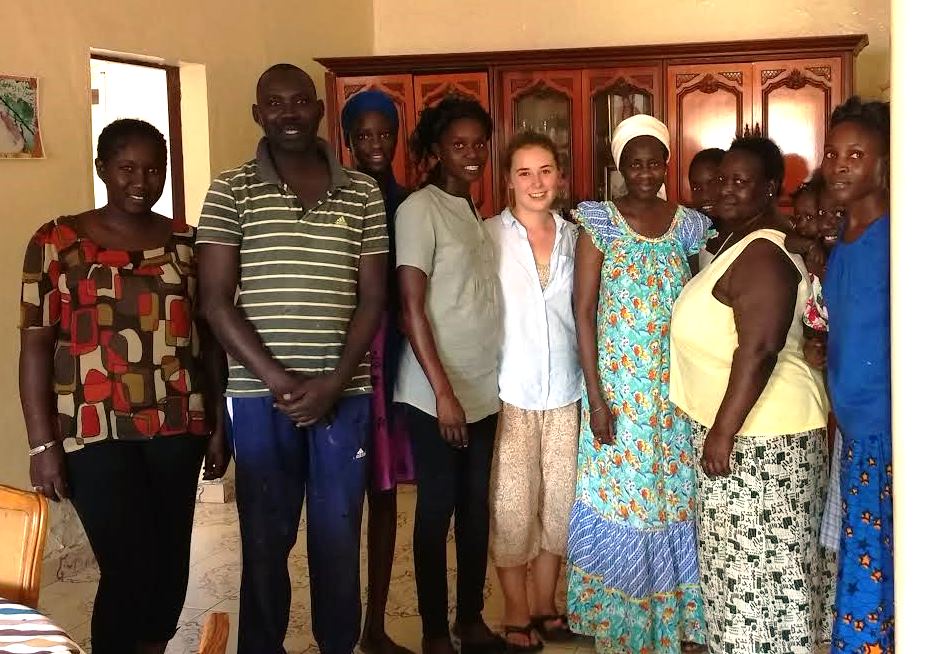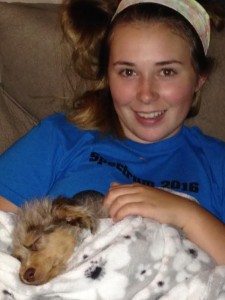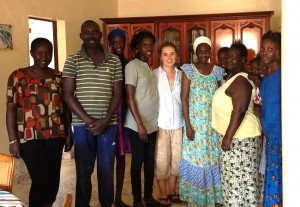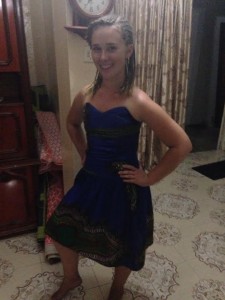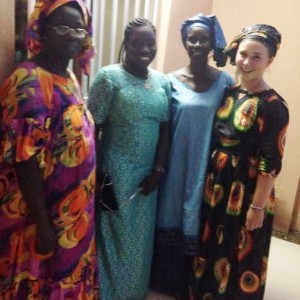WESTFIELD – 2016 Gateway graduate Jenna Margarites is spending her “gap year,” the year between college and high school, in Senegal under the auspices of the Global Citizen Year organization.
Margarites, who grew up in Russell but moved to Westfield with her family last year, finished her senior year at Gateway with distinction. She was senior class vice president and secretary of the Student Council. She was a founding member of Gateway’s Best Buddies club and served as its President and Vice President, as well as a founding member of Model United Nations, serving as its Director of Fundraising and Finance, and earning an Outstanding Delegate award at the Empire Model United Nations Conference.
A student leader, she also served as communications coordinator, executive committee member and state delegate to the Massachusetts State Student Advisory Committee with the Massachusetts Department of Elementary and Secondary Education (DESE).
But when it came time for college, although she filled out many college applications, Margarites began to feel restless.
“I had planned on going straight to college and then I realized how un-excited I was. I didn’t want to keep going on like I was (staying up late studying, always worrying about what was going to be on the next test and if I was going to pass). I felt like I had been in hyperdrive for so many years and it had finally caught up with me. I started looking into programs like Global Citizen Year and finally decided on this one for a few reasons: Global Citizen Year gives substantial financial aid, it was an entire year, and I would be living with an actual host family,” Margarites wrote from Senegal.
Global Citizen Year (GCY) was launched in 2009 as a “bridge” between high school and college, offering opportunities for young people to learn about themselves through real world work and immersion before college.
Their website www.globalcitizenyear.org describes themselves in this way: think big. Imagine if you had a year to shape your own education. How would you design it? What can you learn when you close the textbook? Passion? A new language? A global perspective? Where would you build your classroom of one?
The organization itself was the dream of GCY founder & CEO Abigail Falik. After nearly a decade working as a social entrepreneur in the U.S. and in communities around the world, Falik enrolled at Harvard Business School. In 2008, she entered the Harvard Business School “Pitch for Change” competition with her vision that one day, a global bridge year before college would become the norm, not the exception. Falik won first place in the competition, catalyzing Global Citizen Year’s transition from a big idea into a reality.
“Our program was launched totally independently from colleges. Falik wanted to join the Peace Corps after high school, but (found) college completion is a requirement. After going to college and earning two masters, she launched Global Citizen Year with the idea that it could fit nicely as a trajectory,” said David Omenn, vice president of development.
In 2009, GCY launched a pilot program with 11 students from across the country. In 2016, Margaritas is one of 115 high school graduates living in Brazil, Ecuador, India and Senegal. GCY has a team on the ground in each country, with a team leader and mentors – one to each 10 fellows, as the students in the program are called.
During the year abroad, fellows receive one to one coaching and mentoring. Groups within the country come together every few weeks. They try to strike a balance of immersing students in the country with having enough guidance and oversight, according to Omenn.
They also have formal goals for the program, and the team leaders develop a curriculum that maps to the entire year. The program is focused on language fluency, cross-cultural competency, and experiential learning.
“Now that I’m here I know I made the right choice,” Margarites said. “While internet is very sparse and technology is constantly failing me (especially in the case of voting and email), I love it here. Every morning I get up and remember where I am and smile. I’m learning how to make Senegalese clothing and so much more. I teach English at a local high school and the kids are so excited for a change in the traditional lesson plans (I’m not the sole teacher; I am the equivalent of a teaching aid in the US),” she added.
“I love my life here. I live very close to the ocean and I run every morning on the beach with my sister. I have a tutor that comes twice a week to help me learn my French, Seereer, and Wolof. My family has been extremely patient with me in helping me adjust. The hardest thing here has been trying to reconcile my life in the United States and my life here. I have so many things in the United States: a good education, scholarships, a job, a car, food, electricity, warm water, lots of clothing, games, books…even a library. Here, a person is lucky if they have two or three outfits. I was very fortunate in that my host family is well off, but even so it is nothing compared to the US. We still can only afford rice for our meals and meat a few times a week. There is also no system of sanitation with the trash so trash piles up everywhere on the streets,” Margarites writes.
Margarites also writes a blog that is posted on the website that describes in detail her host family, some of the difficulties (and mistakes) when learning a new language, and also observations on the cultural differences between Senegal and the U.S. Margaritas’ mother, Deborah Hersey, was unsure at first about her daughter’s plans.
“I was very hesitant, at first,” Hersey said. “When she first brought it up, I thought probably closer to college time, she’d end up going off to college.”
Hersey said her daughter kept applying to colleges. But in December of last year, she said to her mother that she wanted to go overseas, and asked her, ‘which of these places is more me.’
Hersey told her daughter that if she wanted to do the program, she couldn’t afford to send her. She said Jenna worked odd jobs, watched dogs and kids, got two jobs and saved her money.
The program costs about $32,000 per year, but according to Omenn, they have a needs-blind admission. 80% of the fellows receive needs-based financial aid and one-third receives full scholarships, many of them first generation college students. He said there is a large diversity of student groups in the program.
Hersey said Jenna did get a scholarship from the program, but the rest of the tuition she came up with herself through tag sales, bake sales, a lot of support from family and friends, and teachers in Gateway.
“I told her it’s not for me personally, but this is the time of your life to do it. I never want you to not do something, because it’s something you think your parents don’t like,” Hersey said. She said she worries about her daughter’s health and her safety, but, “I think she’s doing something that a lot of people later in life regret not doing. She’s going to come back a better person, just going out of your comfort zone,” Hersey said.
Initially, GCY required deferred college acceptance before entering the program, but Omenn said they have dropped that requirement.
“We found that a number of students were choosing to reapply to colleges, after learning about themselves and gaining new interests,” Omenn said. He said 91% of students that reapplied were admitted to either more selective or a better fit school than originally planned.
“What we found now, is somewhere between half and two-thirds are coming in with deferred college acceptance,” Omenn said.
Margarites, who has deferred admission to Haverford College, has already found that her interests are changing.
“Actually, before I left for here I was sure I wanted to be a pediatric neurologist but now that I’m here I’m not so sure. After seeing how people live in other parts of the world (and the lack of basic resources like water, food, electricity, and jobs) I’ve been reconsidering. I know that whatever I do I want to be able to make the biggest impact possible so that could very well be teaching.”
“After I finish my gap year here, I will be going to Haverford College. I’m committed to Haverford College so they have held a place for me while I explore and learn this year on the one condition that I don’t pursue other college credits. I have one complaint about the gap year process and that is scholarships. I won some scholarships before I left for my gap year and unfortunately I had to forfeit them despite the fact that I was enrolled at Haverford (but I also was allowed to postpone countless others). That is something that needs to change if we want all students to be able to take gap years,” she said.
Global Citizen Year does consider themselves as a preparation for college. They have formal partnership with the New School and Tufts University. They also work with a number of other colleges, including Harvard and Stamford. Omenn said at Harvard, the admissions dean encourages students to take a year off, and at Stamford, 50 kids per year defer. The admissions office at Stamford encourages students to come back after time meaningfully spent, he said.
GCY recently surveyed their 450 alumnae, and learned they are going into fields all across the spectrum, including social sciences, and hard sciences with a math and science-focused approach. Omenn said 20% are designing their own majors, which are entrepreneurial minded after seeing what this looks like out in the world, and wanting to combine various elements.
The application is all online, and students are interviewed by Skype, with the majority of interviews conducted by alumnae.
“We are selective, we want to make sure students who are admitted make the most of the program,” Omenn said. He said about 50% of the students who apply get in.
Surprisingly, they don’t look at grades or test scores. They focus on three things: drive and motivation, a clear sense of how this fits into a broader educational journey; an exhibited pattern of curiosity, and persistence, what happens when you’re faced with an obstacle.
“Learning happens in your stretch zone,” Omenn said.
What is evident for Margarites is that she’s taking it all in.
“Being in a situation like this has caused me to realize a few things. One is that I cannot possibly live my life in the US without doing something, or at least attempting to do something, to support countries like Senegal. That could mean economic pressures like not buying certain products or working in the development sector but I know that I would never be able to live with myself if I just stood by and watched. Another is that I need to get an education. I have no answers to these very complex problems. The only way I can be of any use to anyone here or even myself, is if I get an education. And finally, I’ve learned that Senegal isn’t the only country that goes without. In the United States we have a lot of things, but we have nothing on the communities in Senegal. I couldn’t tell you more than four of my neighbors’ names in the U.S. Here, I know them all. And I actually know them–what they want to be, what they like, who they are,” she writes.
“I think more students should take gap years because it’s important to see what the world has to offer. It’s so easy to hide behind a textbook and classroom and tell yourself you’re learning the best you can. There is no equivalent to going out into the real world to see what you’ve only heard about. Also, I think that this experience will greatly impact the way I view my college. When I learn about poverty or economics, I am not just going to think in numbers–I will be thinking of real people and faces,” Margarites added.
Hersey said her daughter will be home in April. She said she will miss her during her birthday and the upcoming holidays, but gets to talk to her on the phone.
“I enjoy listening to her,” Hersey said. “Most people talk about their kids, but my kid is the greatest. Her successes are her own.”

